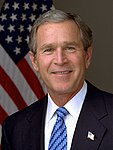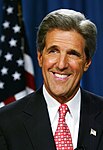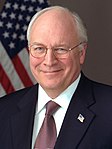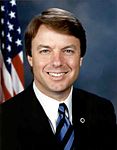This article includes a list of general references, but it lacks sufficient corresponding inline citations. (March 2019) |
| ||||||||||||||
| ||||||||||||||
2004 United States vice presidential debate | ||||||||||||||
| ||||||||||||||
| ||||||||||||||
The 2004 United States presidential debates were a series of debates held during the 2004 presidential election.
The Commission on Presidential Debates (CPD), a bipartisan organization formed in 1987, organized four debates among the major party candidates, sponsored three presidential debates and one vice presidential debate. Only Republican nominee George W. Bush and Democratic nominee John Kerry met the criteria for inclusion in the debates, and thus were the only two to appear in the debates sponsored by the Commission on Presidential Debates. The CPD-sponsored vice presidential debate took place between their respective vice presidential running mates, Dick Cheney and John Edwards.
An alternative was proposed by the Citizens' Debate Commission, but was not carried out. There were several third-party candidate debates also held independently from the CPD-sponsored debates. The debates were the latest in a series of presidential debates first held during the 1960 presidential election and held every four years since the 1976 election.
Post-debate polls generally suggested that the 2004 presidential debates were a positive factor for John Kerry's candidacy, as CNN/USA Today/Gallup immediate post-debate polls showed that Kerry clearly won the first and third debates in the eyes of the American television audience, and he tied with Bush in the second. In the follow-up polls taken days after the first two debates, Kerry's perceived positive performance in the debates increased, so that the public then saw Kerry, rather than Bush, as the winner of all three debates.[1]
- ^ Saad, Lydia (October 15, 2004). "Do Debates Affect Presidential Contests?". Gallup. Retrieved March 26, 2018.



